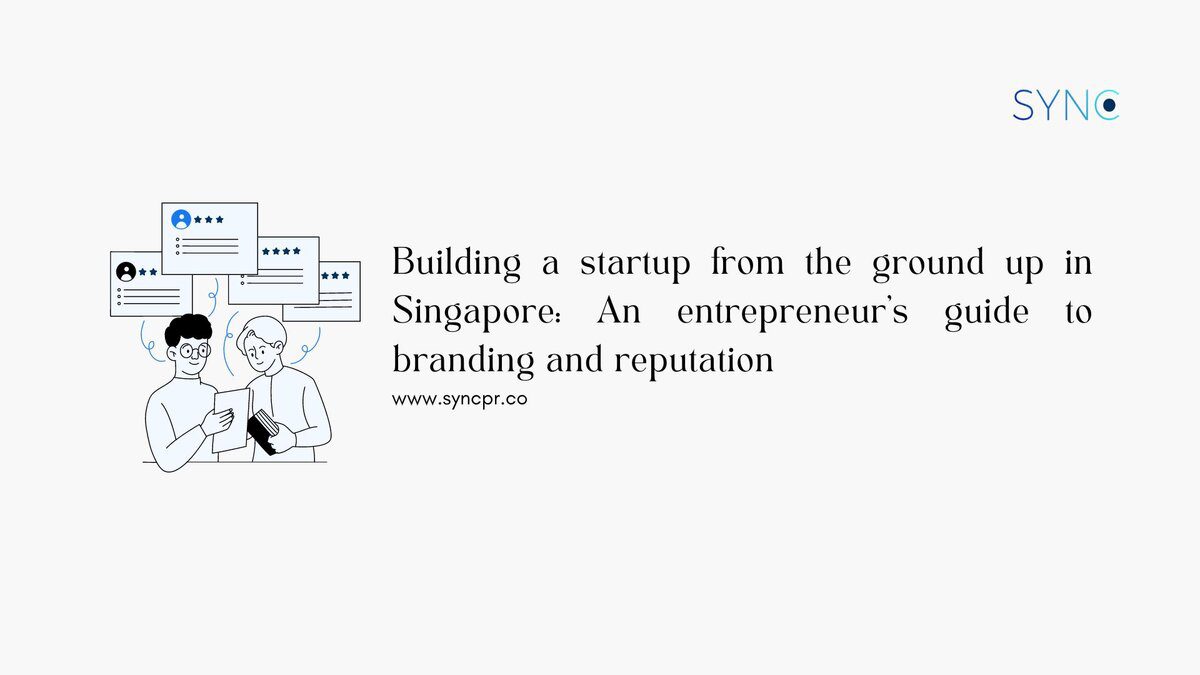Branding for startups in Singapore is crucial in the nation’s competitive landscape. Singapore’s startup ecosystem has flourished in recent years to become the 8th best in the world, which has resulted in a competitive landscape for new businesses looking to establish themselves. 77% of consumers rely on brand familiarity to shape their purchasing decisions, emphasising its vital role in market success. Despite this, many entrepreneurs fail to recognise that branding and reputation management are indispensable.
To thrive and sustain a business, entrepreneurs must realise the strategic imperative of establishing a unique identity that will be rooted in consumers’ minds. A strong brand identity not only differentiates startups but also communicates values and promises to consumers. Simultaneously, effective reputation management safeguards against crises, reinforcing the venture’s foundation.
This guide to reputation and branding for startups in Singapore introduces entrepreneurs to the basics of branding and reputation, with strategies and tips on how their businesses can forge enduring connections with consumers and sustain themselves in the long run.
What’s the difference between branding for startups in Singapore and reputation?
The distinction between reputation and branding for startups in Singapore lies in their focus and perception. A brand is the deliberate, strategic image a business creates through its identity, messaging, and values. These aspects help shape the business and inform the wider audience about its novelty among the other businesses it competes within the market. Essentially, it’s how a company presents itself to the world and how it wants to be perceived by its audience. Reputation is the collective perception and opinion of a business formed by its actions, behaviour, and interactions with all its stakeholders, including customers, employees, and the public. It is a cumulated, overall impression that everyone has of the business built over time.
In essence, the key difference is that while a brand is crafted and controlled by the business, reputation is what others say and believe about the company based on their experiences and observations. Hence, for a startup to succeed, entrepreneurs must recognise the differences between the two and effectively be able to manage both brand and reputation simultaneously.

The basics of business branding for startups in Singapore
Define the brand
At the core of a successful brand lies a well-crafted identity. This includes defining the startup’s mission, values, and unique selling proposition (USP), which serve as the cornerstone upon which the brand story is built. By weaving a narrative that is relevant and distinct, it strikes a chord with target audiences, establishes a profound connection with them and fosters brand loyalty much more easily.
Design visual brand elements
Visual brand elements play a pivotal role in shaping perceptions and leaving a lasting impression. As an overview, we’ve listed elements that businesses must consider for their brand:
- A visually appealing logo that is recognisable and captures the business’ essence
- A colour palette that evokes desired emotions and imagery
- A typography selection that reflects the brand personality
There must be consistency across all channels and collaterals that adopt these brand elements, as it reinforces brand recognition and top-of-mind recall whenever customers encounter these touchpoints.
Develop the brand voice and messaging
While visually crafting elements that will capture customers’ attention, businesses must develop a distinct brand voice and messaging strategy. This includes defining a communication style that bridges the brand personality and resonates with your audience. Akin to the visual elements, the messaging strategy must communicate the brand’s value proposition effectively. Aligning brand messaging with target audience preferences and market positioning ensures that the business stands out amidst the noise of the competitive landscape.
In all, with a meticulous brand strategy, there is consistency across all elements and ensures that the business is consistent in how it presents itself to its target audience.
How to build up a business reputation with PR
Curate stellar customer experiences
A business with an established reputation for customer service will likely attract more customers and retain them for longer. This is because customers value good communication, responsiveness, problem-solving, and personalised attention from brands they interact with. By placing utmost importance on customer satisfaction and consistently exceeding expectations, businesses can cultivate a loyal customer base while leveraging feedback and reviews to continually refine and enhance their products or services.
Engage in thought leadership
Many entrepreneurs refrain from engaging in thought leadership early on, however, it serves as a powerful strategy to establish credibility and authority within the industry. This involves positioning oneself as an expert through thoughtfully curated content creation on platforms like LinkedIn and sharing insightful perspectives on relevant topics to the business market. Active participation in industry events, speaking engagements, and networking opportunities further solidifies the entrepreneur’s reputation as a trusted leader in their field, which in turn bolsters the business’ reputation through association with the entrepreneur.
Cultivate brand advocates
By nurturing relationships with loyal customers and employees, brands can encourage them to become enthusiastic brand ambassadors, spreading positive word-of-mouth that puts the brand in a favourable light. Aside from this, startups can also consider collaborations and partnerships with other relevant brands or key influential figures. This allows startups to tap into the other partnering brand’s/figure’s audience or reach, reinforcing its reputation as a trusted and respected entity in the marketplace.
Managing reputation and branding for startups in Singapore with effective PR
Build a strong online presence
With the world becoming increasingly digitised and interconnected online, startups must build an online presence to widen their reach across various stakeholders and target audiences. This involves enhancing the business’ website with search engine optimisation (SEO) strategies to enhance visibility and ensure consistent branding across all online platforms that are linked to the main website. Social media platforms provide opportunities to engage with the audience, share valuable content, and cultivate meaningful connections with customers.
Monitor online and offline conversations
With the advent of social media and digital platforms, consumers now have the power to voice their opinions and experiences, which could uplift a business’ reputation or plunge it into crisis. To comprehensively monitor such conversations, startups can adopt listening tools, sifting through vast amounts of data to track mentions and analyse sentiments associated with these mentions between positive, negative, and neutral feedback.
Manage crisis effectively
If the sentiments shared among stakeholders and consumers are negative, there is a risk of crisis should it not be handled earlier on. In such cases, it is strongly recommended to develop a crisis management strategy for startups to handle any risks and issues proactively. This ensures that any unforeseen challenges or controversies that surface can be handled immediately, minimising any damage to the business reputation and maintaining stakeholder confidence. Transparency and communication are key components of this strategy, as businesses must address concerns openly and honestly to rebuild trust and safeguard their reputation in the long term.
Building a brand and reputation is a long-term effort
Reputation and branding for startups in Singapore is a journey that requires dedication, consistency, and foresight. As mentioned above, such efforts must be done simultaneously, and actively revisited to ensure that all stakeholders’ needs are satisfied and aligned with the startup’s goals and objectives. Ultimately, startups that invest in building a strong brand and reputation today lay the foundation for sustained growth, resilience, and competitive advantage in the future. By embracing the long-term nature of this effort, businesses can forge lasting connections with their audience and establish a strong presence in their respective industries.
If you want to understand how you can effectively manage your startup’s brand and reputation, or learn more about how PR can add value to your brand, drop us an email at hello(a)syncpr.co.

